新概念英语-youth
新概念英语青少版2A-unit

目录
contents
Course IntroductionTextbook contentlearning methodlearning resourceLearning Plan
Course Introduction
The topics are presented in a logical order, gradually increasing the difficulty level to challenge students as they progress through the textbook.
The text is accompanied by vibrant illustrations and photos to enhance the learning experience and make it more visually appealing to young learners.
learning resource
CATALOGUE
04
Audio tracks for each lesson
Each lesson in the book comes with a set of audio tracks that allow learners to listen to the dialogues and practice their listening comprehension.
Clear pronunciation
The audio tracks are recorded by native English speakers with clear and accurate pronunciation, providing learners with good listening material.
新概念英语青少版1A(Unit13)

文本改错
给出一篇短文,其中包含一些语法 或拼写错误,要求学习者改正。
文本翻译
将英文句子或段落翻译成中文,或 反之,检验学习者对语言的理解和 表达能力。
05
Learning advice and guidance
Development of learning plans
01
02
03
04
个性化学习计划
Dialogues about asking for and giving information about directions, prices, times, etc.
Learning content
Vocabulary related to services, shopping, and daily life.
Vocabulary related to personal information and daily life.
Learning content
Grammar focus on present simple tense.
Unit 2: Asking for and Giving Information
04
Unit exercises and activities
Vocabulary exercises
01
02
03
词汇匹配
将英文单词与中文意思进 行匹配,帮助学习者理解 并记忆新词汇。
填空练习
给出一个句子,挖去某个 单词,让学习者根据上下 文填写正确的单词。
词汇默写
要求学习者听写英文单词, 检验其对词汇的掌握程度。
学习重点词汇和短语,如“graduation ceremony”,“ceremonial speech”等,并
裕兴 新概念英语笔记:Lesson 101 A card from Jimmy

Lesson 101 A card from JimmyNew words and expressions:Scotlandcard n.明信片youth n.青年hostel n.招待所,旅馆association n.协会soon adv. 不久write v.写Scot1and n.苏格兰(英国)card n.明信片post card明信片a wedding card 结婚请束a Christmas card 圣诞卡eg. I sent my friend a get-well card.我寄慰问卡给我的朋友。
cards 纸牌,纸牌游戏a membership card 会员证credit card信用卡an ID card身份证youth1) n.青年,年轻人(单复数同形)eg. The youth of the nation is polite in general.该国的青年人一般都有礼貌。
eg. The youth of the nation are polite in general.2) 青年(少年)时期,青春时期eg. He spent his youth in the U.S.A.他少年时代在美国度过。
eg. He studied Italian in his youth.他年轻时学过意大利语。
3) 青春eg. She lost her youth. 她青春不再。
eg. She kept her youth. 她青春依旧。
hostel n.1)招待所,旅馆2) (为学生等年轻人设立的)宿舍association n.协会eg. My father was the president of the dental association.我父亲是牙医协会的会长。
soon adv.1)不久eg. He will be back soon.他不久就会回来。
eg. The show began soon after dinner.表演在晚餐之后很快就开始了。
新概念4 Lesson 5 Youth 知识点
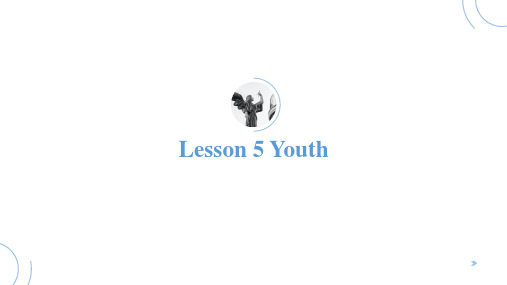
Lesson 5 YouthPeople are always talking about 'the problem of youth'. If there is one --which I take leave to doubt --then it is older people who create it, not the young themselves.人们总是在谈论“青年问题”。
如果这个问题存在的话 --请允许我对此持怀疑态度 --那么,这个问题是由老年人而不是青年人造成的。
解析:“which I take leave to doubt”这是一个插入成分,用两个破折号与句子的主要部分分开。
take leave to do sth.是“擅自做”,“冒昧去做”的意思。
e.g.:I take leave to consider the matter settled.请原谅我认为这件事已经解决。
“it is...who create it..."强调句Let us get down to fundamentals and agree that the young are after all human beings --people just like their elders.让我们来认真研究一些基本事实:承认青年人和他们的长辈一样也是人。
解析:get down to认真处理,认真研究e.g.:Let's get down to business and have a discussion over the problem.我们言归正传,开始讨论问题吧!There is only one difference between an old man and a young one: the young man has a glorious future before him and the old one has a splendid future behind him: and maybe that is where the rub is.老年人和青年人只有一个区别:青年人有光辉灿烂的前景,而老年人的辉煌已成为过去。
(完整word版)新概念英语第一册单词lesson101-120
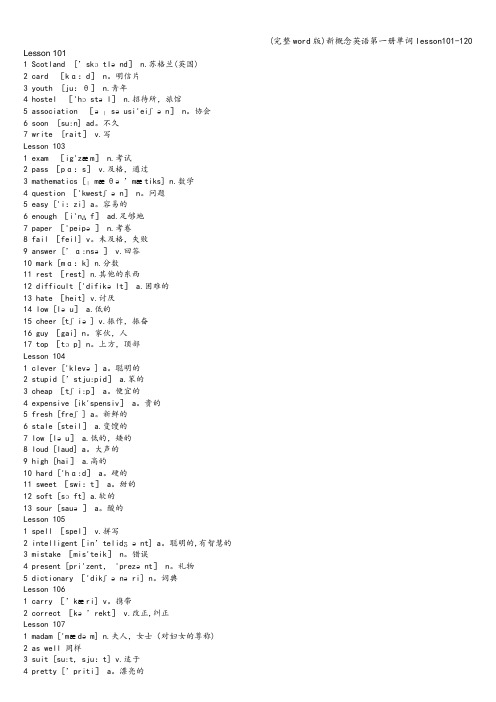
1 Scotland [’skɔtlənd] n.苏格兰(英国)2 card [kɑ:d] n。
明信片3 youth [ju:θ] n.青年4 hostel ['hɔstəl] n.招待所,旅馆5 association [əˌsəusi'eiʃən] n。
协会6 soon [su:n] ad。
不久7 write [rait] v.写Lesson 1031 exam [ig'zæm] n.考试2 pass [pɑ:s] v.及格,通过3 mathematics [ˌmæθə’mætiks] n.数学4 question ['kwestʃən] n。
问题5 easy ['i:zi] a。
容易的6 enough [i'nʌf] ad.足够地7 paper ['peipə] n.考卷8 fail [feil] v。
未及格,失败9 answer [’ɑ:nsə] v.回答10 mark [mɑ:k] n.分数11 rest [rest] n.其他的东西12 difficult ['difikəlt] a.困难的13 hate [heit] v.讨厌14 low [ləu] a.低的15 cheer [tʃiə] v.振作,振奋16 guy [gai] n。
家伙,人17 top [tɔp] n。
上方,顶部Lesson 1041 clever ['klevə] a。
聪明的2 stupid [’stju:pid] a.笨的3 cheap [tʃi:p] a。
便宜的4 expensive [ik'spensiv] a。
贵的5 fresh [freʃ] a。
新鲜的6 stale [steil] a.变馊的7 low [ləu] a.低的,矮的8 loud [laud] a。
大声的9 high [hai] a.高的10 hard ['hɑ:d] a。
新概念课堂笔记第一册Lesson101-102

新概念课堂笔记第一册Lesson101-102 Word Studycard【用法】n. 明信片,卡片【词组】postcard n. 明信片play cards 打扑克,打牌birthday card 生日卡greeting card 祝福卡Christmas card 圣诞卡name card 名片credit card 信用卡an invitation card 邀请卡youth【用法】n. 青年;青年时代(男)青年,小伙子【词组】in one’s youth 在青年时代Youth Hostel 青年招待所youth用于指具体人时,是指初、高中年龄的男青年,小伙子,可用复数。
youth用于集合名词是,指青年,年轻人,表示总称,无复数形式。
hostel【用法】n. 招待所,旅社(校外)学生宿舍,青年招待所hotel n. 旅社,客栈inn n.(尤指乡村或公路边的)旅社,客栈motel n. 汽车旅社association【用法】n. 协会,团体;联合,联系,交往【词组】in association with 与……联合,与……有关soon【用法】v. 不久(今后时态的标志词)【词组】as soon as 一……就……sooner or later 迟早,早晚【例句】I will give you a call as soon as I arrive there. 我一到那儿就给你打。
write【用法】写(wrote-written)【扩展】write a letter 写一封信write to sb. 给某人写信write back to sb. 给某人回信write down 写下,记下【例句】This kind of pens wri tes well. 这种笔专门好写。
NamesPenny /ˈpeni / 彭妮(女子名)Text ExplanationRead Jimmy’s card to me please, Penny.【译文】请把吉米的明信片读给我听听,彭妮。
新概念英语第四册第5课-Youth
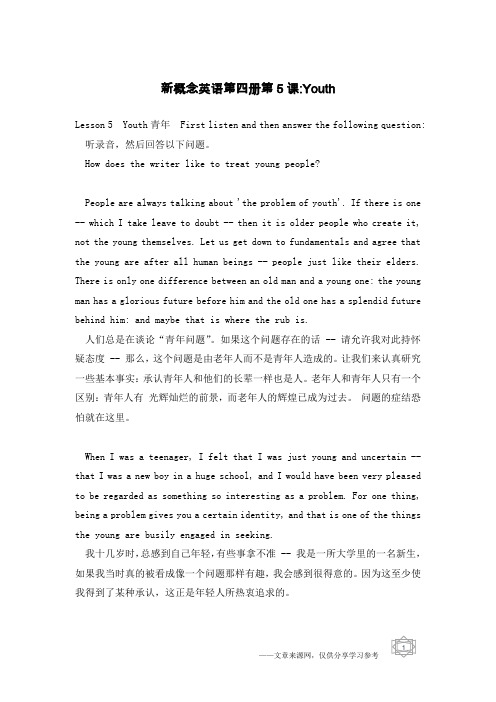
新概念英语第四册第5课:YouthLesson 5 Youth青年 First listen and then answer the following question: 听录音,然后回答以下问题。
How does the writer like to treat young people?People are always talking about 'the problem of youth'. If there is one -- which I take leave to doubt -- then it is older people who create it, not the young themselves. Let us get down to fundamentals and agree that the young are after all human beings -- people just like their elders. There is only one difference between an old man and a young one: the young man has a glorious future before him and the old one has a splendid future behind him: and maybe that is where the rub is.人们总是在谈论“青年问题”。
如果这个问题存在的话 -- 请允许我对此持怀疑态度 -- 那么,这个问题是由老年人而不是青年人造成的。
让我们来认真研究一些基本事实:承认青年人和他们的长辈一样也是人。
老年人和青年人只有一个区别:青年人有光辉灿烂的前景,而老年人的辉煌已成为过去。
问题的症结恐怕就在这里。
When I was a teenager, I felt that I was just young and uncertain -- that I was a new boy in a huge school, and I would have been very pleased to be regarded as something so interesting as a problem. For one thing, being a problem gives you a certain identity, and that is one of the things the young are busily engaged in seeking.我十几岁时,总感到自己年轻,有些事拿不准 -- 我是一所大学里的一名新生,如果我当时真的被看成像一个问题那样有趣,我会感到很得意的。
新概念英语第四册美音版005:Youth
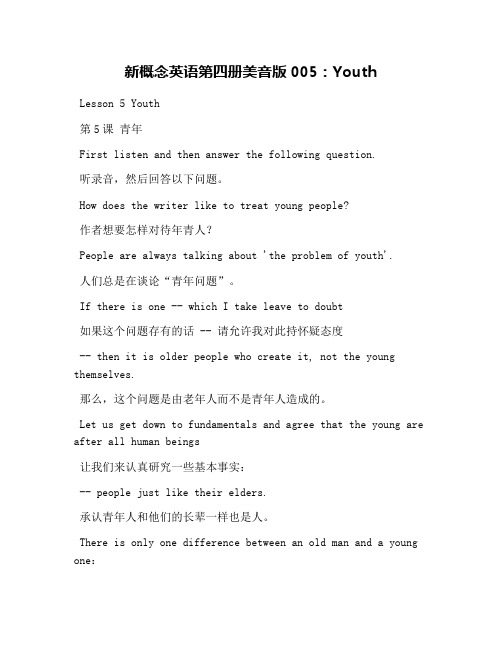
新概念英语第四册美音版005:YouthLesson 5 Youth第5课青年First listen and then answer the following question.听录音,然后回答以下问题。
How does the writer like to treat young people?作者想要怎样对待年青人?People are always talking about 'the problem of youth'.人们总是在谈论“青年问题”。
If there is one -- which I take leave to doubt如果这个问题存有的话 -- 请允许我对此持怀疑态度-- then it is older people who create it, not the young themselves.那么,这个问题是由老年人而不是青年人造成的。
Let us get down to fundamentals and agree that the young are after all human beings让我们来认真研究一些基本事实:-- people just like their elders.承认青年人和他们的长辈一样也是人。
There is only one difference between an old man and a young one:老年人和青年人只有一个区别:the young man has a glorious future before him青年人有光辉灿烂的前景,and the old one has a splendid future behind him: and maybe that is where the rub is.而老年人的辉煌已成为过去。
问题的症结恐怕就在这里。
When I was a teenager, I felt that I was just young and uncertain --我十几岁时,总感到自己年轻,有些事拿不准。
新概念英语L101-L102
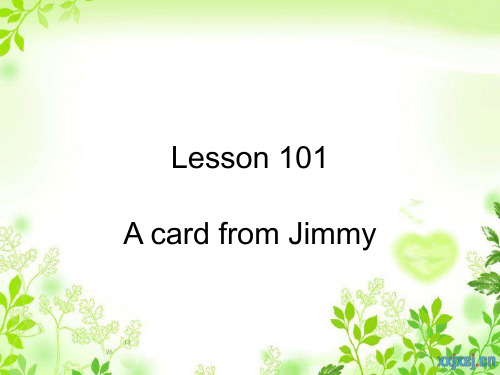
• They said,“our parents often go shopping with us”. • They said, “ she is playing football.” • He said, “ I have lost a book. ” • She said, “the earth is round. • Mr White said, “ Tom is a good boy.” •
Mr. Smith asked, “What is your name?” Mr. Smith asked what my name was.
祈使句:变为间接引语时多用“名词(代
词)+不定式”结构。 1)引述表示命令的祈使句,常用动词order, tell, warn; 2)引述表示请求的祈使句,常用动词ask, beg; 3)引述表示建议、劝告的祈使句,常用动词 advise等。 The boss said,“Please come here again tomorrow.” --The boss asked me to go there again the next day.
• 指示代词,时间状语,地点状语和 动词调整
this these; that now then; today 述不用变) here there; come 用变) those that day(当天转 go(当地转述不
• 疑问句:疑问句语序
陈述句语序 • 一般疑问句:用连词if/ whether引导 • 特殊疑问句:仍用原来的疑问词 • Mary asked Tom, “ Do you like playing football?” Mary asked Tom if he liked playing football.
新概念英语-youth
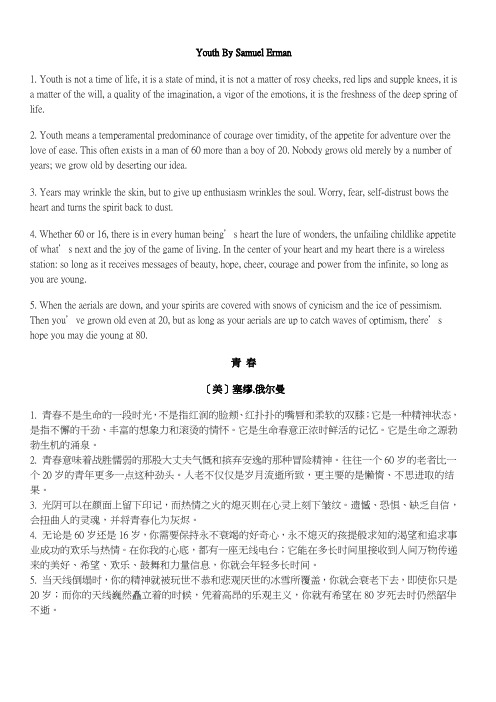
Youth By Samuel Erman1. Youth is not a time of life, it is a state of mind, it is not a matter of rosy cheeks, red lips and supple knees, it isa matter of the will, a quality of the imagination, a vigor of the emotions, it is the freshness of the deep spring of life.2. Youth means a temperamental predominance of courage over timidity, of the appetite for adventure over the love of ease. This often exists in a man of 60 more than a boy of 20. Nobody grows old merely by a number of years; we grow old by deserting our idea.3. Years may wrinkle the skin, but to give up enthusiasm wrinkles the soul. Worry, fear, self-distrust bows the heart and turns the spirit back to dust.4. Whether 60 or 16, there is in every human being’s heart the lure of wonders, the u nfailing childlike appetite of what’s next and the joy of the game of living. In the center of your heart and my heart there is a wireless station: so long as it receives messages of beauty, hope, cheer, courage and power from the infinite, so long as you are young.5. When the aerials are down, and your spirits are covered with snows of cynicism and the ice of pessimism. Then you’ve grown old even at 20, but as long as your aerials are up to catch waves of optimism, there’s hope you may die young at 80.青春[美]塞缪.俄尔曼1. 青春不是生命的一段时光,不是指红润的脸颊、红扑扑的嘴唇和柔软的双膝;它是一种精神状态,是指不懈的干劲、丰富的想象力和滚烫的情怀。
(最新版)新概念英语第四册-lesson-5-青年---new-concept-english-4-lesson-five-youth

用助动词do / does / did+动词原形表强调
• I saw Sheldon on the street last night.
did see
助动词随人称的数、时态变化
not...until…
He didn’t know it was a prank until he came into the office. take leave to doubt—then it is older people who create it, not the young themselves.
在英语中,我们常用It is / was……that……结构来突出强调句 子的某一成分。 在这个句型中,it没有词汇意义,只是引出被强调的成分。
But the point of much recent work is that in essence nothing has changed since 1944. I take leave to doubt this.
北京新东方 英语学习部
But the point of much recent work is that in essence nothing has changed since 1944. I take leave to doubt this.
If there is one—which I take leave to doubt—then it is older people who create it, not the young themselves.
北京新东方 英语学习部
if there is one中的 one 指 a problem of youth。 呼应主题 (主题词复现)
新概念英语四册课堂笔记:Lesson5Youth青年.doc
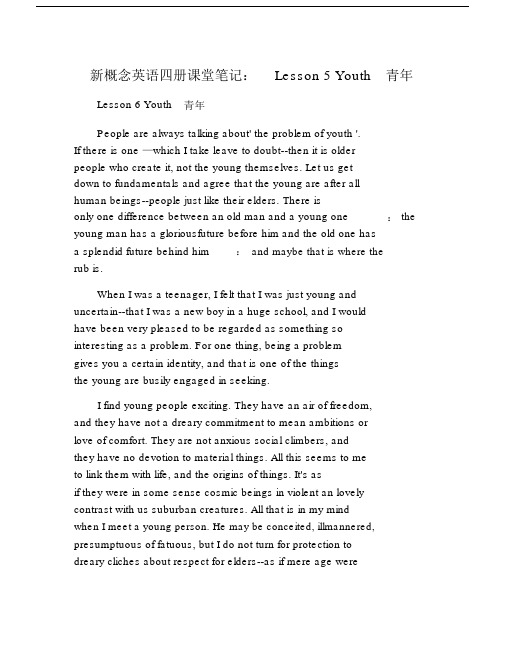
新概念英语四册课堂笔记:Lesson 5 Youth青年Lesson 6 Youth 青年People are always talking about' the problem of youth '.If there is one —which I take leave to doubt--then it is olderpeople who create it, not the young themselves. Let us getdown to fundamentals and agree that the young are after allhuman beings--people just like their elders. There isonly one difference between an old man and a young one :the young man has a gloriousfuture before him and the old one hasa splendid future behind him:and maybe that is where therub is.When I was a teenager, I felt that I was just young anduncertain--that I was a new boy in a huge school, and I wouldhave been very pleased to be regarded as something sointeresting as a problem. For one thing, being a problemgives you a certain identity, and that is one of the thingsthe young are busily engaged in seeking.I find young people exciting. They have an air of freedom,and they have not a dreary commitment to mean ambitions orlove of comfort. They are not anxious social climbers, andthey have no devotion to material things. All this seems to meto link them with life, and the origins of things. It's asif they were in some sense cosmic beings in violent an lovelycontrast with us suburban creatures. All that is in my mindwhen I meet a young person. He may be conceited, illmannered, presumptuous of fatuous, but I do not turn for protection todreary cliches about respect for elders--as if mere age werea reason for respect. I accept that we are equals, and I willargue with him, as an equal, if I think he is wrong.New words and expressions 生短sb. take leave to do sth. 允某人做某事,冒昧做某事get down to sth. 真研究get down to + 名/名glorious 光的rubteenager 青少年for one thing原因之一,有一点是⋯接⋯for another identity身份air of freedom无拘无束air:神、气dreary沉郁的ambition追名逐利cosmic being宇宙人human being人violent烈的,暴力的suburban 不广的,有偏的conceited自高自大的presumptuous 自以是的,放肆的fatuous愚蠢的clich éI take leave to say⋯我冒昧地⋯ I take leave to be frank恕我直言。
新概念英语青少版入门级b课件

This section provides students with opportunities to practice using the grammar patterns learned in this unit through a variety of activities, including fill in the blank exercises, presence completion tasks, and short compositions
Students are resourced to work on their own or in groups to complete the practice activities and check their answers with the provided key or by consulting a teacher or reference book
Design rich levels, tasks, and reward mechanisms to stimulate learners' competitiveness and determination to break through.
Driven by practical tasks, enable learners to learn and apply English in the process of completing tasks.
新概念经典英语作文

新概念经典英语作文新概念10篇经典英语作文通过学习英语文章记忆单词是最行之有效的方法,因为你有真正的使用场景,生动形象,而不是单纯地死记硬背。
店铺为大家精心挑选了新概念10篇经典英语作文,帮你轻松记住1000个单词!背完英语口语棒棒哒!1.Finding fossil man 发现化石人We can read of things that happened 5,000 years ago in the Near East,where people first learned to write.But there are some parts of the word where even now people cannot write.The only way that they can preserve their history is to recount it as sagas--legends handed down from one generation of another.These legends are useful because they can tell us something about migrations of people who lived long ago,but none could write down what they did.Anthropologists wondered where the remote ancestors of the Polynesian peoples now living in the Pacific Islands came from.The sagas of these people explain that some of them came from Indonesia about 2,000 years ago.But the first people who were like ourselves lived so long ago that even their sagas,if they had any,are forgotten.So archaeologists have neither history nor legends to help them to find out where the first 'modern men' came from.Fortunately,however,ancient men made tools of stone,especially flint,because this is easier to shape than other kinds.They may also have used wood and skins,but these have rotted away.Stone does not decay,and so the tools of long ago have remained when even the bones of the men who made them have disappeared without trace.我们从书籍中可读到5,000 年前近东发生的事情,那里的人最早学会了写字。
新概念英语第四册多项选择题:Youth

新概念系列教材的经典早已不言而喻。
今天小编大家带来新概念英语第四册多项选择题,希望能够帮助到大家,下面小编就和大家分享,来欣赏一下吧。
新概念英语第四册多项选择题:YouthMultiple choice questions 多项选择题Choose the correct answers to the following questions.Comprehension 理解1,What's the main difference between young people and old people?a.Old people think of the young as ‘a problem’.b.Old people create this ‘problem’ of age difference.c.Old people have a past; young people have a future.d.Old people and young people forget they are all human beings.2,One of the things young people want to do is to _____.a.find out who they areb.make sure they become ‘a problem’c.feel uncertain about themselvesd.feel they are in a huge school3,According to the writer, young people _______.a.are conceited, ill-mannered or fatuousb.don't see life in the same way their elders doc.don't have any ambitionse from another planet4,The writer doesn't believe that ____.a.people automatically deserve respect because they are oldb.young people and old people are equalsc.you should argue with young people if they are wrongd.young people have any faultsStructure 句型1,The problem, if there is one, ______ by olderpeople.(1.2)a.createdb.is createdc.createsd.is creating2,For one thing, if you ______ a problem, you have acertain identity.(11.7-8)a.wereb.beingc.hadd.are3,______ to be linked with life, and the origin of things.(1.12)a.They seemb.It seemsc.This seemsd.What seems4,It is _______ they are conceited and ill-mannered.(1.14)a.necessaryb.permissiblec.possibled.likelyVocabulary 词汇1,Let us get down to ______.(1.2)a.what is neededb.basicsc.the endd.the bottom2,Perhaps that's where the _____ is.(1.5)a.woundb.problemc.hurtd.injury3,Identity is one of the things in life the young are busy _______.(11.8-9)a.looking atb.looking toc.looking overd.looking for4,That's what I____ when I meet a young person.(11.13-14)a.am annoyed withb.care aboutc.object tod.think about新概念英语第四册多项选择题:Seeing handsMultiple choice questions 多项选择题Choose the correct answers to the following questions. Comprehension 理解1,Solid doors and walls are _____.a.no obstacle for people who can read and detect colours with their fingersb.invisible to people who can read and detect colours with their fingersc.transparent to people who can read and detect colours with their fingersd.concerned in cases reported in Russia recently2,Vera Petrova's father _____.a.had always known his daughter had this talentb.found that his daughter could perceive things with different parts of her skinc.discovered his daughter's gift by accidentd.described the way newspapers were done up in bundles3,The scientific research institute in the town of Ulyanovsk ______.a.made Vera read a newspaperb.arranged that Vera.should undergo a number of experimentsc.tested Vera thoroughlyd.set up a game of Lotto with Vera4,Which one of these statements is true?a.Vera couldn't always perceive things with her skin.b.Vera was occasionally blindfold when she did the tests.c.Vera 's hands had to be wet before she could perceive things through her skin.d.Vera 's knees didn't have the same sensitivity as her fingers.Structure 句型1,________ these tests were being conducted, shewas able to read a newspaper.(1.9)a.Duringb.On occasionc.Whiled.As if2,Vera could n't ‘see.with her skin ______ she wasblindfold.(11.13-14)a.onlyb.exceptc.as ifd.unlessVocabulary 词汇1,This ability was first ____ by her father.(1.4)a.observedb.remarkedc.regardedd.acknowledged2,Vera 's curious talent was brought to the _____ of a research institute.(1.7)a.attentionb.observationc.regardd.care3,······wearing stockings and slippers, she was able to _____ colours with her foot.(11.11-12)a.drawb.seec.understandd.watch4,This abilitythe moment her hands were wet.(1.15)a.continuedb.renewedc.increasedd.stopped新概念英语第四册多项选择题:Matterhorn manMultiple choice questions 多项选择题Choose the correct answers to the following questions.Comprehension 理解1,Modern climbers differ from their predecessors because they _____.a.like to find the easiest way to the top of a mountainb.like sportc.prefer difficult climbs to easy onesd.always follow a particular route2,It is probably true to say that modern climbers ____.a.enjoy testing themselves on difficult climbsb.avoid dangerous situationsc.are not as well equipped as earlier climbersd.are only interested in getting to the top of a mountain3,The pioneers had a hard time because ____.a.Zermatt and Chamonix had rapidly become popularb.Alpine villages were primitivec.the mountains were extremely highd.there wasn't anything to eat4,It is probably true to say that early climbers _____.a.had seven course dinners when they were climbingb.didn't mind uncomfortable conditionsc.always found accommodation with the local priestd.enjoyed a higher standard of living back homeStructure 句型1,Earlier climbers liked summits _____ had never been climbed before.(11.2-4) a.whichb.which theyc.that theyd.unless they2,____ single aim was getting to the top.(11.6-7)a.They'reb.Therec.Theird.Theirs3,_____ Zermatt and Chamonix, most places wereunknown.(11.8-9)a.Exceptb.Unlessc.Withoutd.Apart from4,_____ were generally dirty and flea-ridden.(11.10-11)a.The few inns that existedb.Inns like thisc.Such innsd.Few innsVocabulary 词汇1,In the pioneering days this was not the ______ at all.(1.2)a.conditionb.situationc.historyd.event2,They often faced difficulties of the most ____ nature.(11.4-5)a.dangerousb.dreadfulc.extremed.pitiful3, -all washed down with _____wine.(1.12)a.courseb.sourc.roughd.new4,Often a valley ______ no inn at all.(1.12)a.was proud ofb.advertisedc.showedd.possessed新概念英语第四册多项选择题:Youth。
(美音版)新概念英语第四册:Lesson5Youth.doc

(美音版)新概念英语第四册:Lesson 5 Youth Lesson 5 Youth第 5 课青年First listen and then answer the following question:听录音,然后回答以下问题。
How does the writer like to treat young people?作者喜欢怎样对待年轻人?People are always talking about 'the problem of youth'.人们总是在谈论“青年问题”。
If there is one -- which I take leave to doubt如果这个问题存有的话--请允许我对此持怀疑态度--then it is older people who create it, not theyoung themselves.那么,这个问题是由老年人而不是青年人造成的。
Let us get down to fundamentals and agree that the youngare after all human beings让我们来认真研究一些基本事实:-- people just like their elders.承认青年人和他们的长辈一样也是人。
There is only one difference between an old man anda young one :老年人和青年人只有一个区别:the young man has a glorious future before him青年人有光辉灿烂的前景,and the old one has a splendid future behind him :and maybe that is where the rub is.而老年人的辉煌已成为过去。
问题的症结恐怕就在这里。
When I was a teenager, I felt that I was just youngand uncertain --我十几岁时,总感到自己年轻,有些事拿不准--that I was a new boy in a huge school,我是一所大学里的一名新生,and I would have been very pleased to be regarded as something so interesting as a problem.如果我当时真的被看成像一个问题那样有趣,我会感到很得意的。
新概念英语青少版1Bunit

Teacher's Book
内容概述
教师用书包含了课程的所有教学材料,包括课程目标、教 学方法、课堂活动组织等,为教师提供了全面的教学指导 和支持。
特点
教师用书的设计简洁明了,方便教师快速查阅和使用。同 时,书中还提供了丰富的教学案例和课堂活动,帮助教师 更好地引导学生学习和掌握课程内容。
使用建议
通过课堂上的听力练习,评估学生对 英语听力材料的理解程度。
口语表达能力
评估学生的口语表达能力,是否能清 晰地表达自己的观点。
Evaluation of homework completion status
作业完成度
检查学生是否按时完成作业,完 成的作业是否符合要求。
作业质量
评估学生作业的质量,包括答案 的正确性、书写的规范性等。
A focus on both language knowledge and skills development, with a balance between grammar and communicative activities.
Interactive and engaging teaching methods to encourage students' active participation and enhance their learning experience.
情境对话
设计各种情境对话,让学 生模仿并改编,提高语言 运用和创新能力。
Task based teaching
设计实际任务
结合课程内容和学生实际 需求,设计具有实际意义 的任务,让学生在完成任 务中学习和掌握语言。
小组合作
鼓励学生分组合作,共同 完成任务,培养团队协作 和沟通能力。
新概念英语第四册第5课_Youth
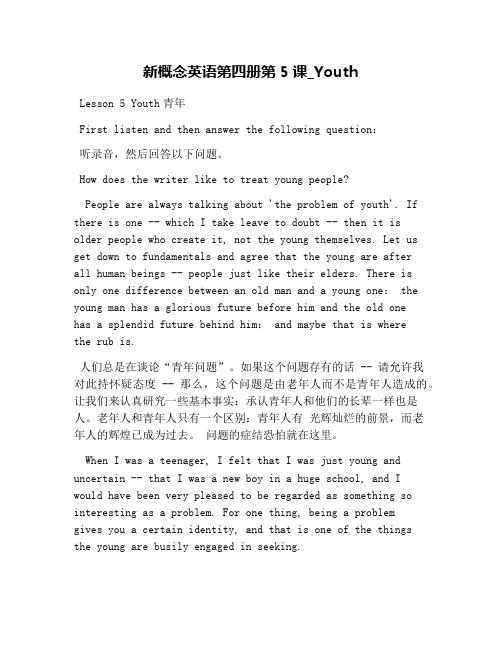
新概念英语第四册第5课_YouthLesson 5 Youth青年First listen and then answer the following question:听录音,然后回答以下问题。
How does the writer like to treat young people?People are always talking about 'the problem of youth'. If there is one -- which I take leave to doubt -- then it isolder people who create it, not the young themselves. Let us get down to fundamentals and agree that the young are afterall human beings -- people just like their elders. There is only one difference between an old man and a young one: the young man has a glorious future before him and the old onehas a splendid future behind him: and maybe that is wherethe rub is.人们总是在谈论“青年问题”。
如果这个问题存有的话 -- 请允许我对此持怀疑态度 -- 那么,这个问题是由老年人而不是青年人造成的。
让我们来认真研究一些基本事实:承认青年人和他们的长辈一样也是人。
老年人和青年人只有一个区别:青年人有光辉灿烂的前景,而老年人的辉煌已成为过去。
问题的症结恐怕就在这里。
When I was a teenager, I felt that I was just young and uncertain -- that I was a new boy in a huge school, and I would have been very pleased to be regarded as something so interesting as a problem. For one thing, being a problemgives you a certain identity, and that is one of the thingsthe young are busily engaged in seeking.我十几岁时,总感到自己年轻,有些事拿不准 -- 我是一所大学里的一名新生,如果我当时真的被看成像一个问题那样有趣,我会感到很得意的。
- 1、下载文档前请自行甄别文档内容的完整性,平台不提供额外的编辑、内容补充、找答案等附加服务。
- 2、"仅部分预览"的文档,不可在线预览部分如存在完整性等问题,可反馈申请退款(可完整预览的文档不适用该条件!)。
- 3、如文档侵犯您的权益,请联系客服反馈,我们会尽快为您处理(人工客服工作时间:9:00-18:30)。
Youth By Samuel Erman1. Youth is not a time of life, it is a state of mind, it is not a matter of rosy cheeks, red lips and supple knees, it isa matter of the will, a quality of the imagination, a vigor of the emotions, it is the freshness of the deep spring of life.2. Youth means a temperamental predominance of courage over timidity, of the appetite for adventure over the love of ease. This often exists in a man of 60 more than a boy of 20. Nobody grows old merely by a number of years; we grow old by deserting our idea.3. Years may wrinkle the skin, but to give up enthusiasm wrinkles the soul. Worry, fear, self-distrust bows the heart and turns the spirit back to dust.4. Whether 60 or 16, there is in every human being’s heart the lure of wonders, the u nfailing childlike appetite of what’s next and the joy of the game of living. In the center of your heart and my heart there is a wireless station: so long as it receives messages of beauty, hope, cheer, courage and power from the infinite, so long as you are young.5. When the aerials are down, and your spirits are covered with snows of cynicism and the ice of pessimism. Then you’ve grown old even at 20, but as long as your aerials are up to catch waves of optimism, there’s hope you may die young at 80.青春[美]塞缪.俄尔曼1. 青春不是生命的一段时光,不是指红润的脸颊、红扑扑的嘴唇和柔软的双膝;它是一种精神状态,是指不懈的干劲、丰富的想象力和滚烫的情怀。
它是生命春意正浓时鲜活的记忆。
它是生命之源勃勃生机的涌泉。
2. 青春意味着战胜懦弱的那股大丈夫气慨和摈弃安逸的那种冒险精神。
往往一个60岁的老者比一个20岁的青年更多一点这种劲头。
人老不仅仅是岁月流逝所致,更主要的是懒惰、不思进取的结果。
3. 光阴可以在颜面上留下印记,而热情之火的熄灭则在心灵上刻下皱纹。
遗憾、恐惧、缺乏自信,会扭曲人的灵魂,并将青春化为灰烬。
4. 无论是60岁还是16岁,你需要保持永不衰竭的好奇心,永不熄灭的孩提般求知的渴望和追求事业成功的欢乐与热情。
在你我的心底,都有一座无线电台;它能在多长时间里接收到人间万物传递来的美好、希望、欢乐、鼓舞和力量信息,你就会年轻多长时间。
5. 当天线倒塌时,你的精神就被玩世不恭和悲观厌世的冰雪所覆盖,你就会衰老下去,即使你只是20岁;而你的天线巍然矗立着的时候,凭着高昂的乐观主义,你就有希望在80岁死去时仍然韶华不逝。
罗素(1872-1970),是一个活了99岁的哲学家。
然而,他最大的魅力却不是哲学,而是文学。
曾经获得诺贝尔文学奖——文学中最高奖项的他,用自己的朴实优美的语言为你讲述怎样才能度过一个成功的晚年。
美文欣赏之罗素HOW TO GROW OLDBy Bertrand Russell1. In spite of the title, this article will really be on how not to grow old, which, at my time of life, is a much more important subject. My first advice would be to choose your ancestors carefully. Although both my parents died young, I have done well in this respect as regards my other ancestors. My maternal grandfather, it is true, was cut off in the flower of his youth at the age of sixty-seven, but my other three grandparents all lived to be over eighty. Of remoter ancestors I can only discover one who did not live to a great age, and he died of a disease which is now rare, namely, having his head cut off。
2. A great grandmother of mine, who was a friend of Gibbon, lived to the age of ninety-two, and to her last day remained a terror to all her descendants. My maternal grandmother, after having nine children who survived, one who died in infancy, and many miscarriages, as soon as she became a widow, devoted herself to woman’s higher education. She was one of the founders of Girton College, and worked hard at opening the medical profession to women. She used to relate how she met in Italy an elderly gentleman who was looking very sad. She inquired the cause of his melancholy and he said that he had just parted from his two grandchildren. “Good gracious”, she exclaimed, “I have seventy-two grandchildren, and if I were sad each time I parted from one of them, I should have a dismal existence!” “Madre snaturale,” he replied. But speaking as one of the seventy-two, I prefer her recipe. After the age of eighty she found she had some difficulty in getting to sleep, so she habitually spent the hours from midnight to 3 a.m. in reading popular science. I do not believe that she ever had time to notice that she was growing old. This, I think, isproper recipe for remaining young. If you have wide and keen interests and activities in which you can still be effective, you will have no reason to think about the merely statistical fact of the number of years you have already lived, still less of the probable brevity of you future.3. As regards health I have nothing useful to say since I have little experience of illness. I eat and drink whateverI like, and sleep when I cannot keep awake. I never do anything whatever on the ground that it is good for health, though in actual fact the things I like doing are mostly wholesome.4. Psychologically there are two dangers to be guarded against in old age. One of these is undue absorption in the past. It does not do to live in memories, in regrets for the good old days, or in sadness about friends who are dead. One’s thoughts must be directed to the future and to things about which t here is something to be done. This is not always easy: one’s own past is gradually increasing weight. It is easy to think to oneself that one’s emotions used to be more vivid than they are, and one’s mind keener. If this is true it should be forgotten, and if it is forgotten it will probably not be true.5. The other thing to be avoided is clinging to youth in the hope of sucking vigor from its vitality. When your children are grown up they want to live their own lives, and if you continue to be as interested in them as youwere when they were young, you are likely to become a burden to them, unless they are unusually callous. I do not mean that one should be without interest in them, but one’s interest should be contemplative and, if possible, philanthropic, but not unduly emotional. Animals become indifferent to their young as soon as their young can look after themselves, but human beings, owing to the length of infancy, find this difficult.6. I think that a successful old age is easiest for those who have strong impersonal interests involving appropriate activities. It is in this sphere that long experience is really fruitful, and it is in this sphere that the wisdom born of experience can be exercised without being oppressive. It is no use telling grown-up children not to make mistakes, both because they will not believe you, and because mistakes are an essential part of education. But if you are one of those who are incapable of impersonal interests, you may find that your life will be empty unless you concern yourself with you children and grandchildren. In that case you must realize that while you can still render them material services, such as making them an allowance or knitting them jumpers, you must not expect that they will enjoy your company.7. Some old people are oppressed by the fear of death. In the young there is a justification for this feeling. Young men who have reason to fear that they will be killed in battle may justifiably feel bitter in the thought that they have been cheated of the best things that life has to offer. But in an old man who has known human joys and sorrows, and has achieved whatever work it was in him to do, the fear of death is somewhat abject and ignoble. The best way to overcome it – so at least it seems to me – is to make your interests gradually wider and more impersonal, until bit by bit the walls of the ego recede, and your life becomes increasingly merged in the universal life. An individual human existence should be like a river – small at first, narrowly contained within its banks, and rushing passionately past rocks and over waterfalls. Gradually the river grows wider, the banks recede, the waters flow more quietly, and in the end, without any visible break, they become merged in the sea, and painlessly lose their individual being. The man who, in old age, can see his life in this way, will not suffer from the fear of death, since the things he cares for will continue. And if, with the decay of vitality, weariness increases, the thought of rest will not be unwelcome. I should wish to die while still at work, knowing that others will carry on what I can no longer do and content in the thought that what was possible has been done.新概念四册美文小辑l But, if this world is not merely a bad joke , life a vulgar flare amid the cool radiance of the stars , and existence an empty laugh braying across the mysteries , if there intimations of something behind and behind are mot evil humor born of madden us ;if , in a word , beauty means something , yet we must not seek to interpret the meaning . --From New Concept English (Book 4 ) Lesson 29但是,即使这个世界不仅仅是个拙劣的玩笑,生命不仅仅是星体交织的寒光中的一点平庸的火花。
